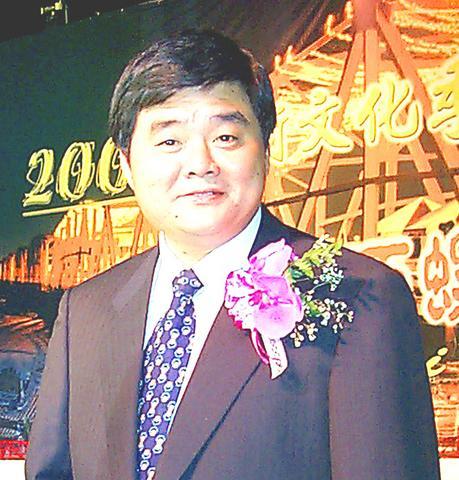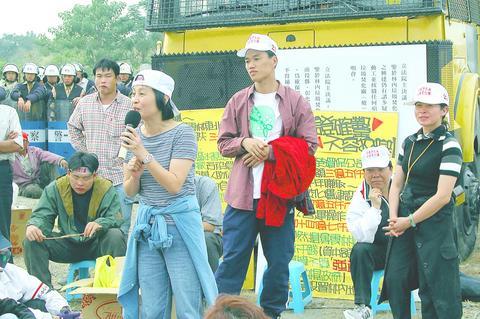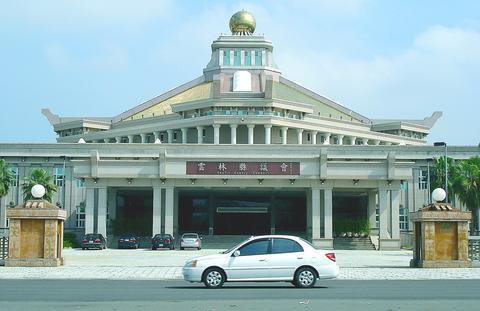Taiwan's agricultural backwater county of Yunlin is so poor that the county government still cannot afford to provide clean tap water for most of its 750,000 residents.
However, its county council didn't bat an eye when it poured NT$700 million into a grandiose council hall approved by its speaker Chang Jung-wei (

PHOTO: GEORGE TSORNG, TAIPEI TIMES
While Yunlin may lack clean drinking water, it has never been short of crime syndicates whose tentacles reach all over Taiwan, earning the county the popular moniker of "hometown of the mobsters."

PHOTO: TAIPEI TIMES
The county commissioner Chang, now in exile, has never denied his close relationship with the underworld community.
Throughout the period of single-party KMT rule in Taiwan until 2000, mobsters-turned-politicians learned every trick to siphon off huge amounts of government funds for local construction projects, such as new parks, schools or roads.

PHOTO: FILE PHOTO
Some of these dangerous criminals in disguise would advance step by step in their political careers from township representatives, to county councilpersons and all the way up to legislators. A few, like Chang, have even been elected county commissioners or city mayors.

PHOTO: FILE PHOTO
Fulbright scholar Chin Ko-lin (
Chang, a well-known syndicate member from Tuku, Yunlin, was born into a farming family. The young Chang in his early twenties was jailed for three years in a 1984 nationwide crackdown on gangsters. Upon his release from prison, he worked as an aide to Chen Shi-chang (陳錫章), a local underworld leader and former member of the Control Yuan (監察委員) under the KMT government.

FILE PHOTO
Another underworld "big brother" and former KMT legislator from Yunlin is Lin Ming-i (
By 1989, at the tender age of 28, Chang was elected county councilman for the first time and only months later ascended to the post of the county council speaker, mainly courtesy of Chen's behind-the-scenes maneuvering.
Until last month, Chang, a KMT member when not at odds with the party leadership, enjoyed superb popularity both in the political arena and underworld community in Yunlin. He was even addressed as "King of central Taiwan" (中部王) when he was elected county commissioner in 1999, in a poll that adversaries said was marred by outrageous vote-rigging and intimidation.
Nevertheless, Chang shot himself in the foot in November 2000 when he pushed through a project to build an incinerator in Linnei Township (
Female legislator Su Chi-fen (
Another notable leading figure is county councilwoman Yin Ling-ying (
Chang backed down from the project under intense international pressure against the development scheme. Had the project gone through, Chang could have reaped huge profits since his wife owned part of the hill.
Yin said she made two previous attempts to take the incinerator case to court, but to no avail. She was lucky this time in that she was able to show the prosecutor the operational plan of the incinerator listing various enormously bloated expenses.
For example, Su and Yin convinced the prosecutor to make a calculation of total construction cost for the project. The calculated figure indicated an exceess cost of more than NT$1 billion under items proposed by the county government.
The prosecutor's office was also puzzled by other unusual and, perhaps, unfair business practices in the plan. Under questioning, Linnei Township magistrate Chen Ho-shan (
According to reports, cash transaction records in Chen's bank account traced back the sum of money that was, in fact, related to a land-purchase fund of more than NT$200 million already paid by the county government. The land owner, however, told the prosecutor he had been paid a total of NT$100 million for the land. About NT$90 million was missing from the county fund and the prosecutor would like commissioner Chang to answer related questions.
Before the court order was served to the commissioner's office, Chang left his office and home on Aug. 14 and remains missing. He has given exclusive interviews to two local newspapers either in person or by phone at unknown locations not far from Yunlin County on different days.
As expected, Chang denied all the charges against him and claimed he was the victim of political persecution by the present administration for the reason that he openly supported the Lien-Soong ticket of the pan-blue camp during the March presidential election.
Yin and Su have both recently received death threats from Chang. At least one Yunlin councilman has been on TV to expose an "intimate relationship of holding hands and drinking coffee together" between Legislator Su and the prosecutor working on Chang's case to defame the women.
However, Yin and Su are standing strong. Commenting on Chang, Yin said: "It may simply be too difficult for Chang to realize that there are people in this world who do not care much about personal gains. Chang grew up in a world where brutal violence and personal profit surpass every bit of human value. He may win praise from gangsters who have been blessed with his personal favors. Su and I are just the type who refuse to trade public trust for personal favors or threats."
One elder Yunlin resident made a sharp observation about Chang's disappearance: "Well, Chang accumulated most of his personal wealth from illegally selling sand and gravel dug from the Chuoshui River (

William Liu (劉家君) moved to Kaohsiung from Nantou to live with his boyfriend Reg Hong (洪嘉佑). “In Nantou, people do not support gay rights at all and never even talk about it. Living here made me optimistic and made me realize how much I can express myself,” Liu tells the Taipei Times. Hong and his friend Cony Hsieh (謝昀希) are both active in several LGBT groups and organizations in Kaohsiung. They were among the people behind the city’s 16th Pride event in November last year, which gathered over 35,000 people. Along with others, they clearly see Kaohsiung as the nexus of LGBT rights.

Jan. 26 to Feb. 1 Nearly 90 years after it was last recorded, the Basay language was taught in a classroom for the first time in September last year. Over the following three months, students learned its sounds along with the customs and folktales of the Ketagalan people, who once spoke it across northern Taiwan. Although each Ketagalan settlement had its own language, Basay functioned as a common trade language. By the late 19th century, it had largely fallen out of daily use as speakers shifted to Hoklo (commonly known as Taiwanese), surviving only in fragments remembered by the elderly. In

Dissident artist Ai Weiwei’s (艾未未) famous return to the People’s Republic of China (PRC) has been overshadowed by the astonishing news of the latest arrests of senior military figures for “corruption,” but it is an interesting piece of news in its own right, though more for what Ai does not understand than for what he does. Ai simply lacks the reflective understanding that the loneliness and isolation he imagines are “European” are simply the joys of life as an expat. That goes both ways: “I love Taiwan!” say many still wet-behind-the-ears expats here, not realizing what they love is being an

In the American west, “it is said, water flows upwards towards money,” wrote Marc Reisner in one of the most compelling books on public policy ever written, Cadillac Desert. As Americans failed to overcome the West’s water scarcity with hard work and private capital, the Federal government came to the rescue. As Reisner describes: “the American West quietly became the first and most durable example of the modern welfare state.” In Taiwan, the money toward which water flows upwards is the high tech industry, particularly the chip powerhouse Taiwan Semiconductor Manufacturing Co (TSMC, 台積電). Typically articles on TSMC’s water demand